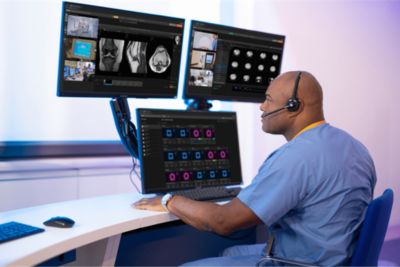
North Star unlocks greater imaging efficiency and consistency across sites with ROCC
- By Philips
- July 16 2025
- 3 min read
When staffing is tight, imaging centers often face canceled appointments, packed schedules or overextended technologists. This leads to more stress, lower job satisfaction and growing attrition among skilled staff. But that is no longer a problem at North Star Diagnostic Imaging, a leading imaging provider in North Texas, USA. North Star implemented Philips Radiology Operations Command Center (ROCC), a remote hub that allows its most experienced imaging technologists to supervise, support and guide scanning operations across multiple sites in real-time.
At-a-glance:
- +1 extra scan per hour by improving efficiency
- Reduced rescans and fewer callbacks
- Hands-on training for less experienced technologists
- Standardized protocols across scanners

From reactive to resilient
Before ROCC, North Star’s expert imaging technologists constantly moved among sites and could only support imaging studies when they were physically present. Staffing was site-specific and could be unpredictable. If someone was unable to work, exams were canceled or temporary staff were called in at an increased cost.
With ROCC, North Star’s most experienced technologists operate from a centralized command center, remotely supporting sites across its expansive network. This allows imaging experts to extend their support and expertise to technologists on-site, regardless of their location. “Now our best techs can oversee multiple sites from the command center. The image quality is just as strong, and we rely a lot less on temporary staffing,” said Todd Wright, MRI Lead Technologist.
We’re no longer completely at the mercy of staffing gaps. ROCC gives us the flexibility to stay fully operational.
Juliana G. Williams R.T. (R)
Radiology Manager
North Star Diagnostic Imaging
Virtual coach in action
North Star uses ROCC to elevate its entire training model. New MR technologists begin with a short on-site orientation, followed by remote support from experienced imaging staff who monitor and guide multiple scanners at once.
This model helps technologists build confidence quickly, especially when handling complex exams or advanced protocols. “Sometimes I take the mouse to demonstrate a scan sequence, but it’s more about coaching them through it so they can do it themselves next time,” explained Stephen Price MBA, BSRT(R) (MR) MRSO (MRSC), MR Safety Officer and Lead Technologist. Each imaging expert completes several weeks of in-person training to build trust and ensure consistency before offering remote support.
We have different new hires scanning across multiple locations at once with backup just a click away. We’re almost cloning ourselves.
Stephen Price MBA, BSRT(R) (MR) MRSO (MRSC)
MR Safety Officer and Lead Technologist
North Star Diagnostic Imaging
With ROCC, imaging experts can remotely:
- Coach newer staff on positioning and safety
- Access the scanners directly [1]
- Answer on-site technologist questions in real-time
- Harmonize protocols across scanners and sites
In fact, one North Star site significantly reduced scan times,* from performing one scan every 30 minutes to performing one scan every 20 minutes. This scan time reduction could result in up to 12 additional patients scanned per day.
Built for expansion
As North Star continues to expand its imaging services, ROCC has proven scalable and sustainable. Opening a new center would previously have required hiring and staffing imaging expert s to work on-site, but now it can rely on the expertise from those in the command center.
North Star is bringing imaging care to rural areas where recruiting imaging experts would have been difficult. With ROCC, they are improving patient access and addressing staffing gaps.
Philips ROCC allowed us to grow into areas where we may not have found the expert technologist talent otherwise.
Juliana G. Williams R.T. (R)
Radiology Manager
North Star Diagnostic Imaging
Philips ROCC has not just helped North Star keep up with demand; it has helped them lead. By centralizing and extending imaging expertise remotely, North Star has built a resilient model that helps them focus on delivering high-quality imaging every time, no matter the location.
North Star imaging customer story
Copy this URLto share this story with your professional network
Sign up for news and updates

Footnotes
- The remote edit function is enabled by Radiology Operations Command Center Console and is only to be used with a qualified user at the scanner.
Disclaimer
Results are specific to the institution where they were obtained and may not reflect the results achievable at other institutions. Results in other cases may vary.